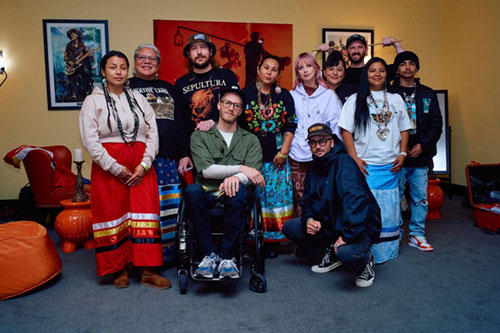From the Trail of Tears to the Trail of Truth – The Muwekma Arrive in D.C.
From the Trail of Tears to the Trail of Truth – The Muwekma Arrive in D.C. November 2024
Between 1830 and 1850, the federal government forced over 60,000 Native Americans belonging to the so-called “Five Civilized Tribes” (Cherokee, Creek, Chikasaw, Chotaw and Seminole) to leave their ancestral homelands in the southeastern parts of the country and move, under the Indian Removal Act of May 28, 1830 to the artificially created “Indian Territory” west of the Mississippi River. This forced migration, and the suffering and sorrows it brought forth, became known as the Trail of Tears. This was but one of the many ways by which the Native Americans were made to suffer and lose almost all of their lands. This was one of the first major legislative departures from the U.S. policy of officially respecting the legal and political rights of American Indian Nations. (see https://www.britannica.com/topic/Indian-Removal-Act)
Federal Recognition

It is almost 2 centuries since the Indian Removal Act came into force and while much has been done, much still remains to be done to rectify the adverse impacts to hundreds of Native American tribal societies. Many of the smaller tribes were, and still are, left out of these rehabilitation processes that have rendered and reduced historic tribes to being invisible and therefore, inconsequential, through the Politics of Erasure. One of the key factors in correcting the historic and administrative wrongs of the past is the reaffirmation of previously recognized tribes and/or granting of federal recognition to these documented tribes. This recognition provides tribes sovereign status which grants them rights to self-government, protects their lands and tribal properties, and makes them candidates for self-determination and economic development. Federally recognized tribes are also “eligible for the special programs and services provided by the United States.” Today there are 574 federally recognized tribes in the U.S.
But What About Unrecognized and Previously Federally Recognized Tribes?
While federally recognized tribes and their members enjoy these benefits and legitimacy in the eyes of the government and the public, there are approximately 400 that have not been given or reaffirmed to this recognized staus. This means these historic tribes are deprived of access to the resources that would enable them to overcome the injustices of the past, and the disadvantages they still labor under prevents them from becoming equal tribal citizens of the U.S. In California itself, there are about 81 tribes that are seeking federal recognition or status clarification as previously federally recognized tribes with little or no help from elected officals.
Among them is the Muwekma Ohlone of the Bay Area. At the time of Spanish contact, the aborignal population of ancestral Bay Area Ohlone speaking tribes numbered around 30,000 people. Today, there are a little over 600 members enrolled in the Tribe. Betwwen 1929 and 1932, the Muwekma families who enrolled with the Bureau of Indian Affairs and living near their historic rancherias near Pleasanton, Sunol, Niles, Livermore, San Leandro/San Lorenzo, and Newark numbered around 62 people due to various disease epidemics (such as small pox, flu, measles, cholera, and tuberculosis, as wellas harsh working condtions during the late 19th and early 20th centuries.
The Muwekma Tribe has a biological presence and history going back 10,000 thousand years and has a proud track record of contributing to the growth of the United States – this includes many tribe members who have served with distinction in the U.S. military spanning from pre and during WWI, WWII, Korea, Vietnam, Desert Storm, Iraq, and still serving today (see https://www.muwekma.org/assets/pdf/Memorial-Day-Muwekma-Ohlone-Military-Service-Master-Updated-5-22-24.pdf).
The Trail of Truth
After years of using all administrative avenues to regain their federal recognition the Tribe deserves, but with no success, the Tribe has still not lost its heart and struggle at social and economic justice. To draw attention to the injustice meted out in the past which is still shackling the Tribe’s growth and ability to contribute to their nation’s citizens, the Tribe embarked on what has been identified as the “Trail of Truth”. This was a horseback ride across the country that started in San Francisco in August and ended in Washington D.C. in October, and was supported by other federally recognized tribes across this United States (https://muwekma.org/TrailofTruth/). As the tribe’s Chairwoman Charlene Nijmeh says “Muwekma Ohlone, along with other unrecognized tribes throughout California, don't have access to educate our children for free and to uplift them from the generational trauma that we have faced, the poverty that we still live in. It's real. It's very real for us. We're not going away. And that's what this truth is about and this journey."
How successful the tribe is in obtaining the restoration of their federally recognized status it deserves depends not only on its efforts, but also on the support of others who wish to see the disenfranchisement and marginalization of tribes in the past and present corrected so that the original inhabitants of the country are given the equal rights and support they deserve.
To learn more about the Muwekma Ohlone, their history, culture, the Trail of Truth, and why they deserve this recognition, go to the tribe’s website.